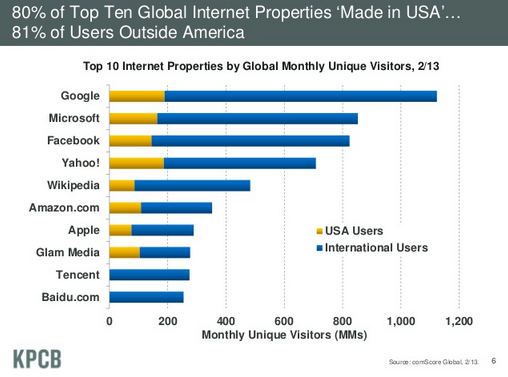Internet’s Annual Report Card Shows China’s Rise
The latest version of venture capitalist Mary Meeker’s Internet Trends report arrived this morning, and some of the most interesting of her 117 slides are about the scale and growth of Internet use and businesses in China.
Both Meeker’s full slide presentation, and a video of her talk at the D11 conference are available online. Here are a few interesting points about the Internet and China from her slides:
- More people in China now access the Web using their phone (75 percent) than with a desktop PC (71 percent). The crossing point was just last year.
- Internet and mobile use take up more of leisure time in China (33 percent and 22 percent of leisure time, respectively) than in the U.S. (26 percent for Internet and 12 percent for mobile use).
- In the past year, Twitter-style Chinese social network Sina Weibo has doubled its userbase to 530 million and grown income from roughly zero to $100 million.
- Alibaba.com – an online retailer serving businesses and more recently consumers, too – is bigger than Amazon and Ebay combined, in terms of gross merchandise volume.
- QR codes are growing in popularity, fast, as a way to connect mobile devices to online content, and for ticketing and payments. Meeker reports that use of QR codes is up four times since march 2012, and shows a striking photo of the UK embassy in Beijing, emblazoned with a giant QR code right next to its front gate, a link to the outpost’s social media account.
One consequence of rapid rise in Internet use for business and pleasure in China can be seen in Meeker’s slide below (it’s number six in her presentation), which rounds up the world’s ten largest Internet properties. Eight are from the U.S., and the other two China’s leading search engine, Baidu, and social network, Tencent.

Those companies made the top ten due to the vast size of China’s population, not by being global players. But as giants like Tencent and Baidu start to run out of new people to sign up within China’s borders, they will likely begin to look abroad. Expect Chinese companies to take up more of those top ten slots in future Meeker presentations.
Keep Reading
Most Popular
Large language models can do jaw-dropping things. But nobody knows exactly why.
And that's a problem. Figuring it out is one of the biggest scientific puzzles of our time and a crucial step towards controlling more powerful future models.
How scientists traced a mysterious covid case back to six toilets
When wastewater surveillance turns into a hunt for a single infected individual, the ethics get tricky.
The problem with plug-in hybrids? Their drivers.
Plug-in hybrids are often sold as a transition to EVs, but new data from Europe shows we’re still underestimating the emissions they produce.
Stay connected
Get the latest updates from
MIT Technology Review
Discover special offers, top stories, upcoming events, and more.